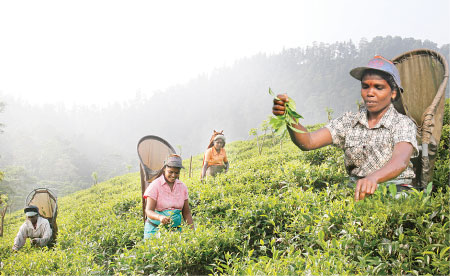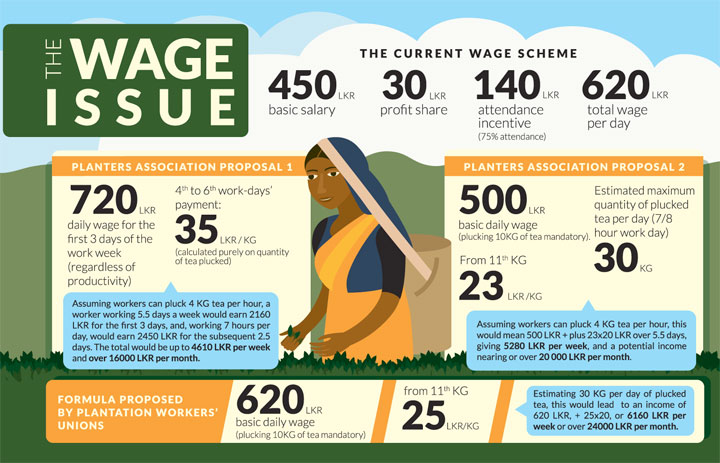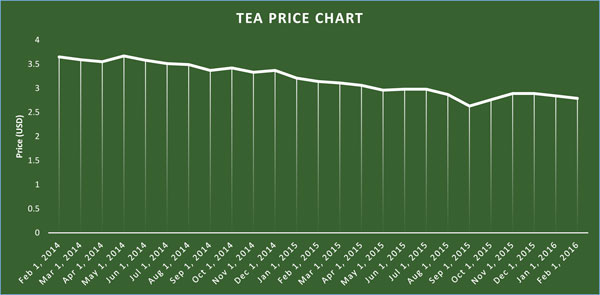Storm in the Tea cup
Estates failing: exports lowest since 2002:
By Sunday Observer Economy Unit
A slump in demand which began with the global economic crisis in 2008
has been exacerbated by unrest in the Middle East and Russia which
consume 60% of Sri Lanka's tea exports.
 |
|
(Pic: by Ranga S. Udugama) |
Last month, export volumes for tea declined to 21 million kilograms,
the lowest figure in 14 years and total tea production is likely to fall
under the 300 million ton mark in 2016 - back to levels seen around the
year 2000.
As production and exports have fallen, costs have risen with the
amount the plantations have to pay for labour, transport and fertilizer
having increased steeply over the past 5 years.
Since mid-2015 the price of tea on the Colombo tea auction has fallen
by over 20% - with a kilo of tea now trading between Rs 60-80 lower than
a year ago. In dollar terms the decline has been even steeper with the
past two years seeing prices fall by over 35%.
Across the sector tea plantations are reporting losses and reducing
production at a time when production in rival producers such as Kenya
and India has stabilized and begun to increase.
The present situation represents the most severe crisis in Sri
Lanka's plantation sector since privatization in 1992. The role of tea
plantations in our economy cannot be overstated. Tea generates over 1.8
billion dollars of revenue (the nation's second largest source of export
revenue) and the tea industry supports over 2 million people or near 10%
of the total population.
Given the vital importance of tea, the Sunday Observer spoke to a
range of stakeholders to ascertain a way forward for the industry,
particularly, the RPCs which dominate the industry but now find
themselves struggling to stay afloat.
What is an RPC?
The Regional Plantation Companies (RPC) were formed in 1992, the
result of efforts by Presidents JR Jayawardene and Ranasinghe Premadasa
who moved to privatize the vast majority of the estates the state had
nationalized in the 70s under the land reform program.
Driven by SLFP governments in the 70s all plantations greater than 50
acres in extent were taken over by the state - however, the state lacked
the capability to effectively manage the plantations and most estates
were severely mismanaged and loss-making following nationalization.
President Jayawardene reorganized the state's plantation holdings
into 22 Regional Plantation Companies with each company comprising
several estates. They were then sold to the private sector via a bidding
process and the RPCs listed on the Colombo Stock Exchange.
In many cases control of the RPCs passed to conglomerates, e.g.
Hayleys, Aitken Spence, Richard Pieris, John Keells all acquired
controlling stakes. Today, there are 20 privately held and 3 state
controlled RPCs.
The creation of private sector driven RPCs reversed a sharp decline
in estate productivity and the government no longer has to bear the cost
of loss making estates. As of 2016 the RPCs produce approximately 40% of
the country's tea (and rubber)and directly support 200, 000 workers with
a total of 1 million plantation residents - making RPCs a key part of
the plantation system and broader economy.
RPCs: A failed experiment?
Despite being an obvious success in terms of stemming state losses
and extricating the state from direct management of thousands of acres
of land, the privatized RPC system has long faced criticism from experts
and stakeholders.
It is alleged, in many cases, privatized estates failed to live up to
their potential as their new owners, while effecting an initial
turn-around, soon began draining profits from the RPCs as management
fees and failed to reinvest sufficiently in the estates.
As proof, critics point to low yields and productivity in many
plantations and a low rate of replanting.
"Two % of the extent of a plantation should be replanted every year,
but this never happened," said Lalin De Silva a former planter and
retired editor of the Plantation Society Bulletin. He added: "In many
estates tea bushes are nearly 100 years old and can't produce high
yields. They (RPCs) say they can't invest now because prices are bad.
But, what happened when prices were good, there were years when
production and prices were excellent - why didn't they make investments
in productivity?"
There have been allegations of outright asset stripping with the
management of some plantations accused of felling timber, selling
livestock and other assets to make profits.
"They under-invested", said Muthusivalingam, Head of the Ceylon
Workers' Congress Union (CWC) - the largest union of plantation workers.
"Living and social conditions in the plantations were neglected, they
can't just blame workers for lack of productivity when they didn't
invest sufficiently in roads, and facilities."
The case for RPCs
While there is criticism of RPCs - a number of plantation experts and
representatives of the plantation companies argue that the RPC system
has been a success and helped revive Sri Lanka's tea industry.
"Overall their performance has been fair,"said Romesh Dias
Bandaranayake, economist and former head of the Plantation Management
Monitoring Division. "Given the [loss-making] condition they were in, in
1992, we've seen the RPCs make a positive contribution to the economy
and government revenue."
Mr Dias explained that the RPCs have contributed Rs. 7 billion to the
government in terms of lease renewal payments alone, and further
contributed in terms of taxes, EPF payments dividends and re-investment.
"Contrast this to the remaining government run plantations - the
Janatha Estate Development Board, which consumes over a billion rupees
of state funds annually. Overall, the RPCs have increased production and
revenue - of course not all the estates have performed equally well but
the strategy of privatization via listing on the stock exchange has
proved successful and robust."
From1992 to 2002 there was a demonstrable increase in tea production
from 200 million to 300 million metric tons.
"We have reinvested far more into plantations than we have taken
out," said Roshan Rajadurai, Chairman, Planters' Association, which
represents the management of all RPCs. "Despite claims by critics, over
60% of the acreage in our tea plantations have been replanted ,
according to Plantation Ministry statistics, so that claims of
mismanagement are simply false."
Even critics of RPCs management agree that a return of the estates to
state control is not desirable. "The workers are worse off in the state
run plantations than the RPCs, so we are not in favour of a return to
state control," said Muthusivalingam CWC President.
A 150 year old model
But, there's no denying that yields on Sri Lanka's tea planttions are
low and avenues for value addition and mechanization have not been
sufficiently explored.
"If you look at the average yield of a Sri Lankan tea plantation it
is around 1,700 tons per hectare while in Kenya and better run estates
in India, the figure is well above 2,000 kilos per hectare- even though
we have good climatic and soil conditions. This is hard for plantation
companies to explain" said Janen Fernando of Verite Research.
The government has also accused the RPCs of mismanagement. Last year,
former Minister of Plantations Lakshman Kiriella insisted the RPCs raise
wages or face action from the government.
Sri Lanka's RPCs have also failed to diversify with the potential for
the production of spices, rearing livestock and dairy production, not
being sufficiently explored. Plantations remain reliant on a 150 year
old labour model where workers spend a lifetime plucking tea for low
wages. "The RPCs need to provide opportunities for the youth on the
plantations, they need avenues for advancement and training - it must be
possible for them to become managers and rise out of poverty," said
Harin Fernando Minister of Telecommunications and Digital Infrastructure
and long-time campaigner for plantation rights.
The wage issue

Sri Lanka's tea estates depend on the manual labour of hundreds of
thousands of low-wage workers.
As the cost of living has risen, unions are demanding an increase in
wages and a government directive stipulating a Rs 2,500 (per month)
salary increase for every worker has put pressure on the plantations to
increase salaries. However, given the diminished revenues, RPCs claim
they are in no position to raise salaries.
Since 1992, representatives of RPCs and trade unions have met
biannually to negotiate standard wages for plantation workers, known as
the Collective Agreement (CA) which fixes wages for a 48 month period. A
new CA is due to be negotiated this year.
The RPCs insist they are willing to consider an overall wage increase
in line with or even exceeding the government directive if productivity
and not simply attendance is made the basis for payment.
At present, the bulk of a plantation worker's wage is calculated on
the number of days he or she reports to work - not on the basis of work
done or the weight of tea plucked.
All stakeholders contacted by the Sunday Observer agreed that
productivity based pay is essential in terms of increasing yields and
securing the future of the estate sector.
 They
point out that rival tea producers like Kenya and India have now adopted
productivity based wage formulas which reward workers for plucking more
tea. However, both sides failed to agree on how a new productivity based
wage formula would be structured. They
point out that rival tea producers like Kenya and India have now adopted
productivity based wage formulas which reward workers for plucking more
tea. However, both sides failed to agree on how a new productivity based
wage formula would be structured.
"We cannot just increase wages - we are struggling, in the past we
have increased wages by as much as 40%, but without in increased
productivity it threatens the whole industry," said Rajadurai.
Union officials on the other hand argue, estates must do more to
enable workers to be more productive.
"We are willing to accept a move to productivity based pay but it
must allow workers to earn a fair wage - which means at least Rs 2,500
or more a month, and RPCs must provide the conditions - maintenance,
sufficient workings days, etc.," said CWC Leader Muthusivalingam.
[Experts say]
The Sunday Observer spoke to stakeholders from across the
plantation industry - below are a summary of their suggestions for the
overall improvement of the RPCs and the broader tea plantation sector
Productivity-focused
The movement to productivity rather than attendance based wage is
critical in the long term survival of the industry. Emphasizing
productivity will boost yields, however, any new mechanism must allow
workers to earn a fair wage and must also take into account the work
they do on the plantation that isn't connected to plucking, e.g.
maintenance, weeding etc.
Checks and Balances
Given a history of serious mismanagement on government run
plantations direct government intervention across the sector is
undesirable, however, government oversight is needed as a check on
RPCs.The Plantation Management Monitoring Division of the Ministry of
Plantations was established to allow the state a mechanism for
regulating and monitoring the RPCs. The Division has been largely
inactive over the past decade but a revived PMMD constituting qualified
state officials and retired senior RPC managers could play a role in
ensuring RPCs fulfil their social and economic mandate.
A board with clear powers could devise an assessment methodology with
annual reviews and rankings of the RPCs and then take action against
those found under performing.
The RPCs must be allowed to function as businesses, albeit with a
social responsibility, while the primary role for caring for estate
populations must fall on the state. When plantations were established
more than a century ago they were entirely responsible for the
communities who lived within them. Health, education and services to
plantation villages were provided by the companies. Today, plantation
communities must be integrated with mainstream society. Clinics and
schools within the plantations are the responsibilities of the state but
the roles for both parties must be clearly delineated.
Training and opportunities for youth
Accessible colleges for technical training must be established
allowing youth on plantations options for progressing into managerial
roles within the tea industry and avenues to seek skilled jobs outside
the plantation sector. The government, RPCs, NGOs and the Private sector
must work together to establish training centres for plantation youth.
Stronger welfare
An expanded welfare scheme operated primarily by the government but
in concert with RPCs and unions is important for ensuring an adequate
quality of life for workers. Bolstered pension, welfare and insurance
support will keep workers from poverty. Today, the injured, sick and
elderly workers struggle to make ends meet.
Value addition
The vast majority of RPC income is derived from the sale of bulk tea
on Colombo's tea auction. RPC must encouraged to emphasize value
addition with companies packaging and directly exporting a greater
proportion of their tea. Tax and loan concessions can be given for the
import of packaging machinery accompanied by targets for value added
exports.
Gender equality
The disparity in pay between men and women where men currently earn
significantly more than women for a day's labour must be rectified as
women typically work longer hours than men and act as primary caregivers
spending the entirety of their income to support their families. |

